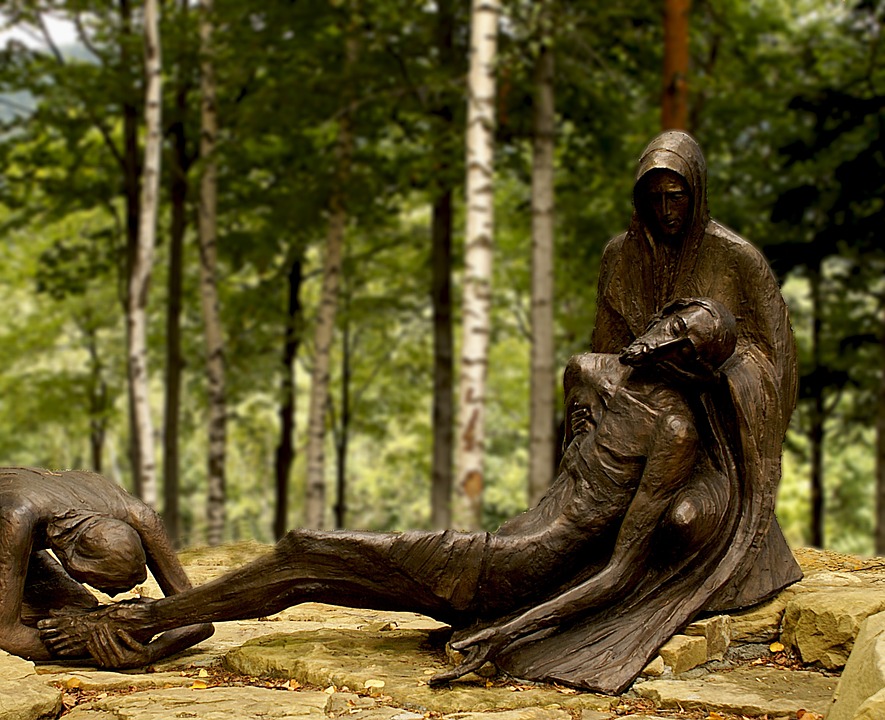


Every single telling of the crucifixion of Jesus Christ, in every single Gospel, goes out of its way to share with us that there were women present when Jesus was lynched. It is women who stand at the forefront of the Christian message: that through Jesus Christ, God has made provision for our redemption and our repair. You cannot preach a message about Jesus Christ’s life and ministry without acknowledging the presence of women, from the prophet Anna who recognized the infant Jesus as God’s redeemer immediately (Luke 2) to Mary and Martha to the many nameless women he healed to Mary Magdalene to Joanna, the wife of King Herod’s steward, Chuza (Luke 8.3), Susanna, and many others, who provided for him out of their resources, and the group of women present with him as he was beaten, crucified, and buried, the woman, Mary Magdalene, eyewitness to the resurrected Christ, and Mary, his mother, who was present for every single bit of it, even present when the Holy Spirit was given in the book of Acts.
The women at the cross are seed-planting women who have been sowing in Jesus’ ministry from the beginning. And now, as Jesus’ hour has come, it is women who gather to be present for him at a site designated for public execution.
The significance to the Christian faith of these women at the cross cannot be overstated. Historians unanimously agree that Jesus died on a cross. In first century Palestine, there would have been stigma about crucifixion…it was a humiliating way to die. According to Deuteronomy 21:23, The Hebrews believed anyone who was left to hang on a tree was cursed. It follows then that anyone who thought highly of Jesus would make up a story that he was crucified. So as the roots of the early Christian church are planted in the bloodied soil of Golgotha’s hill, it is the testimony of women that is integral to the development of the theological arguments upon which we build our faith.
Our Christian hope is bound to the testimony of women who witnessed the horror of the cross. I think about Mary, and what her anguish must have been, standing on a hill watching her son being executed. I cannot imagine what kind of unspeakable anguish it must be, to watch your child, your firstborn, be tortured like this. Is it like the anguish our African mothers felt when faced with the horror that their children were stolen and taken to parts unknown? Is it like the anguish our grandmothers and great grandmothers felt, when American terrorists burst into their homes, corrupting the very concept of civil liberties, as they kidnapped and lynched their sons? What is it like, to see with your own eyes, your son swinging from a tree? Or being nailed to a tree?
It is likely that Mary was also present when Jesus was mocked, ridiculed, abused, and beaten in the most vicious manner; a physical assault that that defies logic in terms of what human beings are capable of doing to each other. She probably overheard the false witnesses speaking certain death for her son, her first born. Surely she must have witnessed him being spat upon and a crown of prickly sharp thorns viciously thrust into his scalp and forehead. She felt every sting of the lash across his body. She watched helplessly as Jesus, so weak from not having eaten nor slept all night and no doubt bleeding heavily from the lash, struggling to carry a cross beam that might have weighed as much as she did. Did she ever stop hearing the sound of nine-inch spikes being hammered into her son’s flesh? Now she watches her son’s execution, an execution that was designed not to eliminate suffering but to maximize it. It is not over quickly. Standing there at the cross, Mary watches as her son is murdered before her very eyes.
As she watches, she wrestles with the realization that her son will soon be no more…and it grips at her like a knife through the gut. Inevitable, impending death. And maybe she is starting to lose it. As a mother, her every instinct must be screaming to save her son…her eyes dart around looking around for a blunt object, something she can use to pull the nails out of his flesh…she knows he doesn’t have much time left…she wonders if she can get enough wine to dress his wounds because her baby is swollen, battered, bruised, bleeding…what must it be like to have to face the knowledge that your child has absolutely no chance of survival? Even if she pulled the nails out with her teeth, Jesus has no chance of survival. He has been on the cross a good while now. Every breath he takes causes him pain. You see it is not the bleeding that kills you, no… that is just to up the pain meter…the torture meter…what kills you in crucifixion is suffocation. In order to breathe, Jesus must pull himself up on the spikes that are violently invading his flesh. These spikes cut deeper into his flesh every time he took a breath. By now, the median nerves are sending shooting pains through his wrists, arms, shoulders, legs, feet. His limbs are probably dislocating from their sockets, because his arms are being held up and outward. His rib cage is in a position that makes it extremely difficult to exhale, and nearly impossible to take a full breath. Jesus would only be able to take very shallow breaths. The longer he languishes on the cross, his muscles, from the loss of blood, last of oxygen and the fixed position of the body, would undergo severe cramps and spasmodic contractions…he is dehydrating. And Mary watches…helpless to do anything to alleviate her child’s pain… knowing there is nothing she can do for Jesus. She can smell pungent, putrid death coming upon him. I would argue that Mary is in as much pain as Jesus at this point.
This child she nursed, helped take his first step, taught his first little words in Hebrew and Aramaic and Greek, is dying before her very eyes. And she is powerless to save him. She couldn’t save him from the rigged trial in front of the authorities; she couldn’t save him from the lash, from the rod, from the fists, from the hammer. I imagine her sanity must be leaving her at this point. Her heart is beating out of her chest because she knows Jesus’ heart will soon stop beating in his. No mother should have her nostrils assailed by the stench of her own child’s blood. And in one of the most poignant moments in the Bible, Jesus acknowledges her. Jesus acknowledges his mother’s grief, and despite his own great pain, Jesus cries out to her: Woman! Behold your son! And this is a term of affection, not disrespect. Woman here is could be understood as “Dear Lady” or “Mommy.” Just as she is about to go straight out of her mind, Jesus reminds her that she will be taken care of. Mommy, behold your son. I won’t be around to do it Mommy, but this disciple will be here for you. You won’t live on the margins scraping a living for yourself. Dear Lady, you will be well taken care. In the last words she will ever hear him speak to her before he gives up the ghost, Jesus is letting her know that she will be taken care of. Despite the pain it must have caused him to say anything, Jesus is thinking of his mother. It is only in the Gospel of John that there is a single male disciple present at the cross, and Jesus asks him to take care of his mother. In this moment, Jesus is making salvific provision for all human beings, and making earthly provision for the woman who raised him. This is the eternal message of Good Friday: that even when death looms, there is hope.